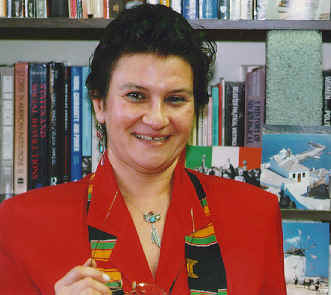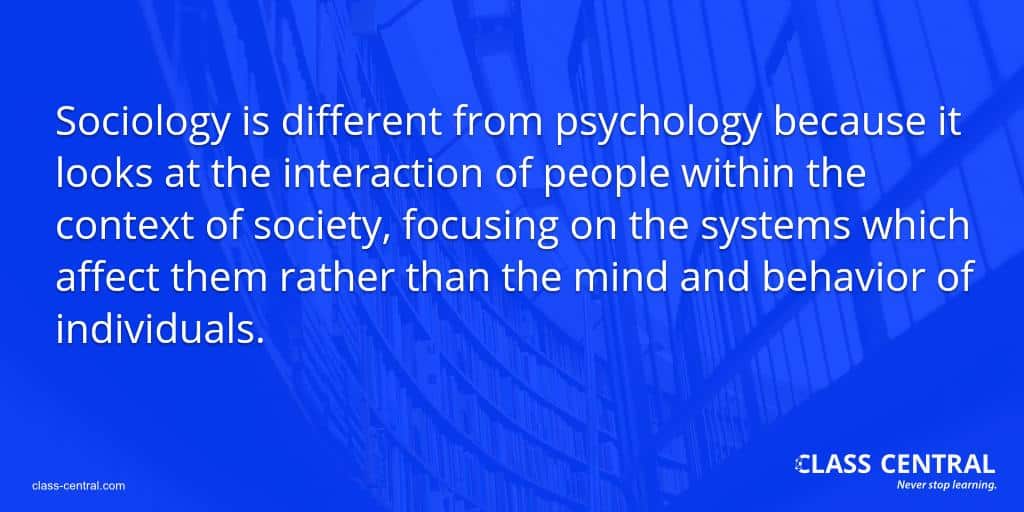Exploring How to Look at Society via a Sociology MOOC
Professor Joanna Hadjicostandi of UTPB discusses her new online course, Introduction to Sociology, which will start on edX on August 25.
Class Central interviewed Prof. Joanna Hadjicostandi of University of Texas of the Permian Basin (UTPB). Prof. Hadjicostandi is teaching Introduction to Sociology on the edX platform, starting August 25, which lasts six weeks. Below is a lightly edited transcript of the email interview.
Class Central: How would you describe the field of sociology and how is it distinct from psychology?
Prof. Hadjicostandi: Sociology is a fascinating field of critical inquiry that allows a learner to combine science and society through theoretical study! It discusses what goes on in society but also why things happen, by looking at the intersection of biography and history; the personal and the public. It looks at topics like race and ethnicity, gender, sexuality, culture, family and religion, deviance, social change, and so much more.
Sociology is different from psychology because it looks at the interaction of people within the context of society, focusing on the systems which affect them rather than the mind and behavior of individuals. There are subsections of both disciplines which overlap though, such as the field of social psychology.
As with all fields of study, sociology has some overlap in these areas of similar inquiry, but each are approached from their distinct perspectives.
Class Central: What are the main methods of data or analysis for sociologists?
Prof. Hadjicostandi: Sociologists typically rely on two fields of methodology. Qualitative analysis involves using theories and concepts that include such things as observation, oral history, case study, performance ethnography. The other primary method is quantitative analysis. It is based on numerical data that is then analyzed using statistical methods. The analysis of the data is considered objective facts and can be generalized to populations. For example, the United States Census data is a popular tool used by sociology students to conduct quantitative data analysis.
Class Central: How much do the findings of sociology tend to be consistent with what people would expect vs. counter-intuitive?
Prof. Hadjicostandi: One of the things we discover in sociology is how groups of people actually behave versus how they report how they behave or how they expect others to behave is not always the same. This often leads to a counter-intuitive effect of what one expects to find during the research process. There are factors that always must be considered in the evolving nature of our social selves. What was expected from societies one hundred years ago is not the same as what we experience today. Our populations are becoming much more interactive due to increased accessibility and affordability for international travel. This, and access to cell phones and the internet allow our societies to interact in a more intimate manner than ever before. We experience the situations that heretofore remained unavailable to us. Now, when a child suffers half way around the world due to war, famine or disease, we can connect with that society and try to find solutions to global problems.
Class Central: What are some of the latest trends in the study of sociology?
Prof. Hadjicostandi: Research into various areas of sexuality has expanded dramatically. There are many other areas that have new trends in research that explore all manner of social conditions. As we do become a more global society, research in the area of world systems theory. Another area of high interest is social mobility and the emerging conditions of a shrinking middle class and increasing numbers of those living in poverty. These topics lead sociology researchers to also investigate the rise of the elite and power classes as they control economic conditions on a global scale.
Another area of high interest is social mobility and the emerging conditions of a shrinking middle class and increasing numbers of those living in poverty.
On the other hand, we have sociologists, such as Patricia Levy who bring new and emerging research methods that include such concepts as fiction based writing, scholarship that is accessible to the public, social justice and equality. In addition literature offered by authors like Tony Morison, Maya Angelou, C. Moraga, or G. Anzaldua as well as scholars like P. Collins, F. Anthias or N. Yuval Davis open our horizons to better understanding of communities and people around us.
Class Central: What are your personal areas of specialty/interest within sociology?
Prof. Hadjicostandi: My areas of interest include the investigation of the role of colonial, post-colonial and capitalist influence on international development, or what we today call globalization from below, as well as the informal sector of the economy, immigration and the intersection of gender, race, social class, sexual orientations and other inequalities on social formations and human relations. In addition I am interested in community formation and the early development of minority communities. Finally, I have looked extensively at the history and role of drugs in society and violence in family and domestic abuse.
Class Central: Who are the target students for your course?
Prof. Hadjicostandi: Target students are those who are self-motivated. Internet-based courses are ideal for people (students, parents, military personnel, persons with disabilities, etc.) with the determination to complete their assignments without being compelled to do it by a teacher or parent. It is up to the student to prioritize their learning and time organization to complete the course.
Students can expect to learn everything they would learn from a traditional, on-campus course. The central expectation is to prepare students to take the CLEP examination and pass it. Thus, by the time students are through reading the material, investigating web sites and discussing the various issues, they should have learned how to look at the world critically. Upon completion of this course they should have developed the ability:
• To examine social institutions and processes across a range of historical periods, social structures, and cultures.
• To use and critique alternative explanatory systems or theories and to appraise differences and issues pertaining to race, gender, sexual orientation, social class, age, physical ability and other characteristics that form bases for personal and institutional discrimination.
• To develop and communicate alternative explanations or solutions for contemporary social issues.
• To identify and understand differences and commonalities within diverse cultures.
Class Central: What types of assignments or exercises will you use in the course?
There is a significant amount of reading for the course.
Prof. Hadjicostandi: There is a significant amount of reading for the course. Readings come from a variety of sources from a textbook, websites, selected book chapters, and white papers. Videos and photographs are also used as visual learning tools. Students can expect to do writing for several assignments. Students will also learn from conducting observations that they encounter at home, school, work, civic and community engagements, and environment. Students are tested periodically on the materials covered. Tests typically consist of multiple choice, matching, true/false, short essay, and fill in the blank questions. All exercises are open book/open notes. However, quizzes are based on the textbook and students (especially ones who wish to take the CLEP exam) will need to be prepared.
Class Central: Can you tell me a little about UTPB?
Prof. Hadjicostandi: UTPB is a University of Texas System campus. We are located in Odessa Texas. The campus draws a significant number of students from the surrounding west Texas towns. Recently, we have expanded our campus and student options. Additional on-campus housing has been built for both traditional students and married student housing. The addition of the Engineering and nursing programs along with the expansion into online instruction has brought about tremendous growth. In 2016, we’ll begin a football program. Our campus President, Dr. David Watts, is a sociologist. We are glad to have him on our team.
Class Central: Finally, given that you have a connection to Greece, do you have any observations on what Greeks are going through with the current financial turmoil?
Prof. Hadjicostandi: This topic very close to my heart–I can first of all say that the situation is extremely complex and would require deep historical, political, economic and social analysis. In a nutshell, the severe recession, capital control and austerity measures that have been placed on the people of Greece over the past five years have affected the socioeconomic fabric of the entire society.
The high levels of unemployment among the youth and adults alike have created a feeling of great instability and concern among the Greek people. The extremely high numbers of suicides and rates of migration of the youth, which created an even more pronounced brain drain, are visible results of the conditions in Greece. Economic development in the country has been shrinking and local businesses have been struggling to remain afloat, thus the creation of a possible reduced level of incentive among some individuals. Despite all that, the beauty of my loving land is still attracting visitors in great numbers.







